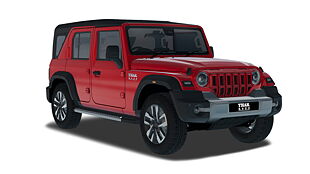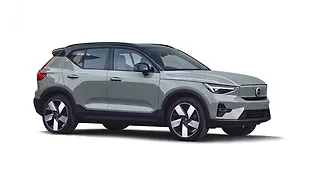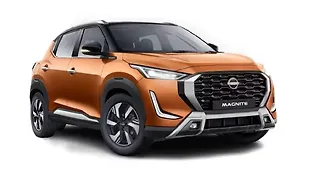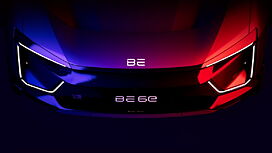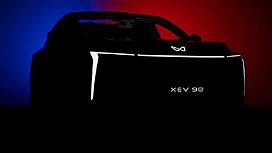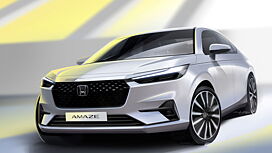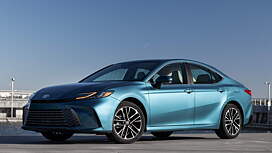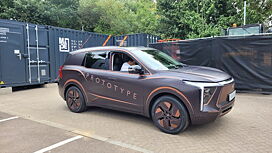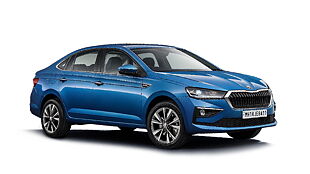Introduction
7 / 10
This is the Skoda Slavia. Yes, under that bright camouflage is a sedan that will replace the Rapid in Skoda India’s product line-up. But, given that it is based on the new MQB A0 IN platform - the exact same platform on which the Skoda Kushaq is based - expect it to be priced higher than the Rapid.
Now, it might seem strange to launch a sedan in today’s day and age, especially in the class that the Slavia is coming in. And we say that for two reasons: one, sedans in general, and in this class in particular, are finding less takers by the day. And two, the class already has some heavy hitters like the Honda City and the Hyundai Verna. And it might be very difficult for Skoda to pull buyers away from the aforementioned two.
But, Skoda doesn’t seem worried. It says, customers want sedans. But they haven’t had a strong enough reason to buy one. And the Salvia, with its looks, it size, and its driving dynamics, will present just that. However, given we drove prototypes, we can’t tell you anything about its interiors, very little about its design, and even when it comes to driving, the Slavia prototypes were not in the final setup. So, chances are, whatever we didn’t end up liking, might get better by the time the car is launched. But for now, let’s tell you how we experienced it. The Skoda Slavia, much like the Kushaq, will be launched with two engine options. Both petrol, and both will be offered with a six speed manual and an automatic. There will be no diesel option, at all.
Affordable One
The three-cylinder, 1.0-litre, near 115bhp TSI engine will be the more affordable option. It is locally made, and even the manual gearbox and the torque convertor automatic it will come mated to, are made in India. So, in terms of cost-effectiveness, and not just in terms of car purchase, but also in terms of repairs, replacement, and overall ownership, this 1.0-litre will be the better option. As far as performance goes, the 1.0-litre is fine, if not great. But, it never feels slow or sluggish. Plus, with its alert throttle response, it feels peppy from the word go. It might not have the lungs to keep the car flying high revs, but low and mid range performance, like we said earlier, is nothing to complain about.

If at all, we would say it begins to sound gruff and unrefined in the mid and top end of the rev range, and it’s not exactly free-revving either. And this will not get better on the production car, in case you were wondering. As for the gearboxes, both the manual and the torque converter do their job well. But, there’s nothing really outstanding to report about their functioning. The manual has relatively short throws for the shifts, the clutch is light to operate, and the shifts, if a bit notchy, don’t require a whole lot to operate. So, driving the manual on a daily basis, shouldn’t be too much of a bother. The automatic, naturally, would be better for city life. It isn’t the quickest shifting, most telepathic, or the sportiest auto ‘box out there, but it’s near seamless, it is predicable, and even in kick-down, it’s rarely caught sleeping, if at all.
Performance Petrol
The 1.5-litre, four-cylinder, near 150bhp TSI petrol, meanwhile, is more refined, smoother, easier revving, and as expected, significantly more power-packed than the 1.0-litre. and if you like driving, this is the option to go for. With the six-speed manual, the acceleration is brisk, if not as exciting as one would expect from a near 150bhp car. And as with the 1.0-litre, the clutch on the 1.5 is light to operate and easy to modulate.

The gear shifts, however, on the prototype we drove, required more effort than the one-litre. Gearshift throws are shorter and sportier on the 1.5, yes, but the overall experience is a more tedious one. Now, Skoda says this can be easily rectified, and we should see an improvement in the production car. As for the DSG, or the dual clutch automatic, it is lovely. The shifts are more intuitive; the level of control is perceptibility higher; and though one has paddle shifters on the 1.5 DSG, one doesn’t need them. It’s more want than need, really.
Road Manners
Now, in terms of steering response, it’s almost identical on both, the 1.0 and the 1.5-litre versions. The steering is light, fluid, linear, and likeable on both. The steering response isn’t exactly quick or slow; it’s more middle of the road if you will. But between the two, the one-litre has a bit more heft, which we preferred. There isn’t as telling a distinction between the two when it comes to ride, handling, and braking though. The handling is light and alert; the ride is pliant for the most part; and the braking is sharp if nothing else on both versions. We found the straight line stability as well as the Slavia’s balance and body control through the fast, winding sections of the Mumbai-Pune Expressway to be very well controlled.
As for the ride, it’s fine through dips and bumps, but only when they come at the Slavia one at a time. Show it a series of unpredictable, uneven, and unwanted potholes or bumps or even road joints, and the ride at the rear starts to feel and sound busy and harsh and not the most comfortable. This again is something Skoda says it will improve upon on the production car. The other area where Skoda will rework the Salvia, is the progression of the brake pedal. Right now the brake bite is a little sudden instead of being linear and having a progressive build up.
Competition Check

In the sedan class, the Slavia is closer to the Verna than the City. Both come with a 1.0-litre turbo petrol instead of the City’s 1.5-litre naturally aspirated engine. Both get dual clutch autos, while the City gets a CVT. But in terms of outright power, the Slavia trails both. It does deliver better torque than the other two, nonetheless. Dimension-wise, the Slavia is the widest, and it sits on the longest wheelbase among the three sedans. And that should, in theory, give it an advantage in terms of interior space. In terms of length and height, though, the City leads the way.
What's next?

The Skoda Slavia will be unveiled in the third week of November. At that time, we will be able to tell you more about the car’s interior, its space, and the kind of features it will offer. As far as its positioning goes, it will sit level with the Kushaq in Skoda India’s product range. Having said that, we expect it to be priced lower than the Kushaq, otherwise the Slavia will have little or no chance at success.

![स्कोडा स्लाविया [2022-2023] लेफ्ट फ्रंट थ्री क्वार्टर स्कोडा स्लाविया [2022-2023] लेफ्ट फ्रंट थ्री क्वार्टर](https://imgd.aeplcdn.com/642x361/n/cw/ec/106393/left-front-three-quarter2.jpeg?isig=0&wm=1&q=80)
![स्कोडा स्लाविया [2022-2023] राइट रियर थ्री क्वार्टर स्कोडा स्लाविया [2022-2023] राइट रियर थ्री क्वार्टर](https://imgd.aeplcdn.com/642x361/n/cw/ec/106393/right-rear-three-quarter5.jpeg?isig=0&wm=1&q=80)
![स्कोडा स्लाविया [2022-2023] लेफ्ट रियर थ्री क्वार्टर स्कोडा स्लाविया [2022-2023] लेफ्ट रियर थ्री क्वार्टर](https://imgd.aeplcdn.com/642x361/n/cw/ec/106393/left-rear-three-quarter0.jpeg?isig=0&wm=1&q=80)
![स्कोडा स्लाविया [2022-2023] लेफ्ट फ्रंट थ्री क्वार्टर स्कोडा स्लाविया [2022-2023] लेफ्ट फ्रंट थ्री क्वार्टर](https://imgd.aeplcdn.com/642x361/n/cw/ec/106393/left-front-three-quarter1.jpeg?isig=0&wm=1&q=80)
![स्कोडा स्लाविया [2022-2023] लेफ्ट फ्रंट थ्री क्वार्टर स्कोडा स्लाविया [2022-2023] लेफ्ट फ्रंट थ्री क्वार्टर](https://imgd.aeplcdn.com/642x361/n/cw/ec/106393/left-front-three-quarter3.jpeg?isig=0&wm=1&q=80)
![स्कोडा स्लाविया [2022-2023] लेफ्ट फ्रंट थ्री क्वार्टर स्कोडा स्लाविया [2022-2023] लेफ्ट फ्रंट थ्री क्वार्टर](https://imgd.aeplcdn.com/642x361/n/cw/ec/106393/left-front-three-quarter4.jpeg?isig=0&wm=1&q=80)
![स्कोडा स्लाविया [2022-2023] इमेज स्कोडा स्लाविया [2022-2023] इमेज](https://imgd.aeplcdn.com/272x153/n/cw/ec/44088/slavia-exterior-right-front-three-quarter-5.jpeg?isig=0&q=80)




